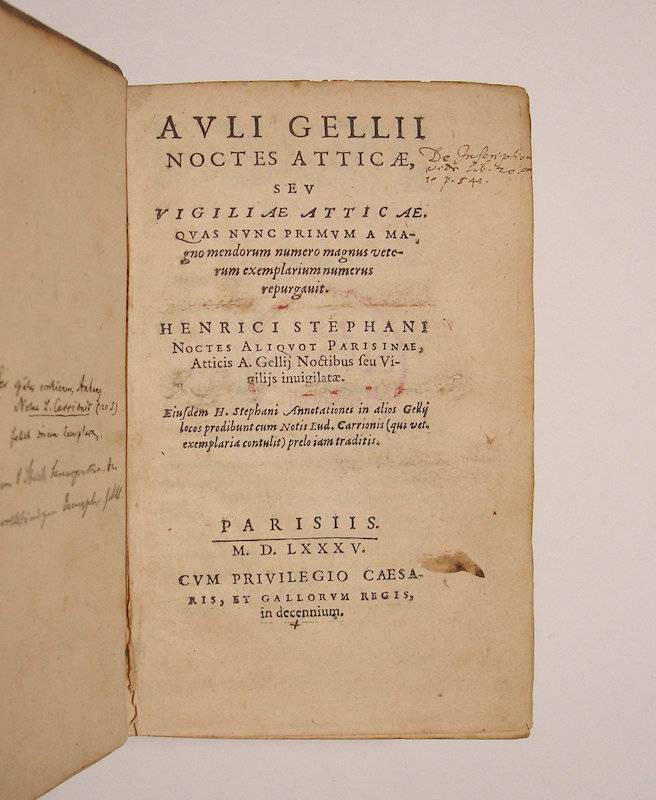GELLIUS.
Auli Gellii Noctes Atticae, seu Vigiliae Atticae, quas nunc primum a magno mendorum numero magnus veterum exemplarium numerus repurgavit. Henrici Stephani Noctes aliquot Parisinae, Atticis A. Gellii Noctibus seu Vigiliis invigilatae. Eiusdem H. Stephani annotationes in alios Gellii locos prodibunt cum notis Lud. Carrionis (qui vet. exemplaria contulit) prelo iam traditis.
Paris (Parisiis), (H. Stephanus), 1585. Cum privilegio Caesaris, et Gallorum regis in decennium.
8vo. (VI),23,(1 blank),587,(1 blank);(74 index),(2 blank),205,(3 blank) p. Vellum 18 cm (
Ref: Renouard p. 450/51, 1585,2: 'édition rare et estimable', Schweiger 2,378; Brunet 1523/24; Graesse 3,46; Ebert 8284) (
Details: 5 thongs laced through both joints. Short title on the back) (
Condition: Vellum soiled and spotted, big red stain on the lower board. Occasional old ink underlinings & marginalia. Small and old inscription on the verso of the front flyleaf. A small reference written on the title. On the verso of the title a round red stamp. Upper corner of the last gatherings slightly waterstained. Paper somewhat yellowing) (
Note: The Roman author Aulus Gellius, ca. 125-180 AD, was never counted as a major author in antiquity, nor later. His only work 'Noctes Atticae' or 'Attic Nights', is a miscellany that 'ranges from literature to law, from wondrous tales to moral philosophy; one of his favorite topics is the Latin language'. (...) The exposition, in a mildly archaizing but never difficult Latin, often takes the form of dialogues with or between culturally eminent persons whom Gellius had known'. It derives its name from the fact of its having been written during the long nights of a winter which the author spent in Attica as a young itinerant student. The Noctes Atticae were exploited by pagans and Christians alike in late antiquity. In medieval florilegia he is much quoted for piquant tales and moral sentiments. 'From Petrarch onward Gellius became a favorite author of the Renaissance'. 'More than 100 manuscripts were copied'. He was used as a valuable source of information on the Latin language, and had preserved numerous quotations from lost authors, which were presented with grace and elegance. Gellius became a model for the 'Miscellanea' of the Italian humanist Angelo Poliziano. 'In the 18th century, however, new canons of elegance caused his style to seem less attractive, and compilation sank to minor merit' (Quotations from 'The Classical Tradition', Cambr. Mass., 2010, p. 386/7)
§ The notes of Louis Carrion, latinized as Ludovicus Carrio (Brugensis), ca. 1547-1595, which are promised on the title page, are lacking in this edition. Carrion had promised the Parisian scholar/publisher Henri Estienne II, ca. 1530-1598, to manufacture notes for his Gellius edition. Estienne printed the text of Gellius, and waited eight months. In the meantime Carrion delivered material for only 7 leaves. Tired of waiting Estienne published his Gellius, replacing Carrion's notes with work of his own: 'Noctes aliquot Parisinae'. Ultimately Carrion sent Estienne notes concerning the first 24 chapters of the first book only, together 120 pages. These notes Estienne thereupon published separately in the same year. Most copies are like ours, in only a few copies both works have been bound together.
§ The 'Noctes Parisinae' are 27 in number, 7 of which are dedicated to Estienne's friend, the historian, politician and bookcollector Jacques Auguste de Thou, 1553-1617, who was in 1585 'maître des requêtes au parlement de Paris'. Estienne extols his friend 'for his erudition, and his extraordinary zeal for the collection of books: noticing the exquisite literary treasures in which his library abounds, his judgment in the selection of editions, his liberal disbursement in purchasing, and his profuse expenditure on binding and decoration'. (William Parr Greswell, 'A View of the Early Parisian Greek Press', London 1833, volume 2, p. 350) The 'Noctes Parisinae' opens with a defence of Gellius against attacks of the Spanish scholar Juan Luis Vives, who mentioned Gellius e.g. 'loquaculus sine eruditione'; and 'quae de significatu vocum disserit, sunt frivola, et plerumque imperita ac falsa'. (Opera, Basel 1555, Tom. I, p. 480/81)) (
Provenance: In pencil on the front flyleaf: '15 sept. 1965', written by the Flemish linguist Walter Couvreur, 1914-1996, who was an Orientalist, and professor of Indoeuropean linguistics at the University of Gent. It indicates the date of aquisition. On the pastedown in the rear he wrote the place where he bought it: 'Leipzig, Zentralantiquariat, DDR'.
§ On the verso of the title a red stamp: 'Ex Biblioth. Regia Berolinensi') (
Collation: A-B8 (minus blank leaf B8), a-z8, A-R8, S4 (leaf S4 blank), A-N8 (a leaf signed A2 inserted as a kind of half title between leaf C1 and C2; leaf N7 verso and N8 blank) (Photographs on request)
Book number: 130065 Euro 565.00
Keywords: (Oude Druk), (Rare Books), Gellius, Latin literature, Noctes Atticae, antike altertum antiquity, römische Literatur
 GELLIUS.
GELLIUS.

